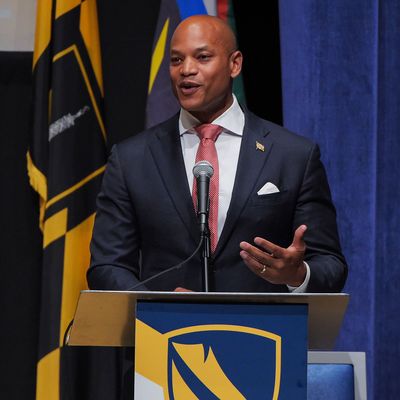
Most national attention on Maryland politics has been focused on the Republican primary in which MAGA extremist Dan Cox defeated Governor Larry Hogan’s protégé Kelly Schulz — with some help from ads touting Cox’s conservative credential by the Democratic Governors Association. But there was a Democratic primary, too. With Hogan term-limited, it was widely assumed that Democrats would recapture the governorship of this heavily Democratic state despite the pro-Republican midterm dynamics, and Cox’s nomination seems to clinch it. (Hogan himself is refusing to back his party’s nominee, whom he has called a “QAnon whack job” and the product of collusion between Donald Trump and the DGA.)
So the next governor of Maryland (as well as the state’s first Black governor) is very likely to be former best-selling author and nonprofit executive Wes Moore, who, in something of a surprise, prevailed over a large and distinguished Democratic field. The longtime front-runner, four-term state comptroller (and before that, a state legislator for 20 years) Peter Franchot, finished an anemic third. That left Moore up against former DNC chairman and secretary of Labor Tom Perez for the nomination during a delayed count of mail ballots. (Under Maryland’s archaic state-election law, mail ballots could not be opened or counted until the Thursday after Tuesday’s primary election.) The Associated Press then called the race for Moore on Friday.
This was Moore’s first race for public office, but he’s been in the public eye since the publication of his best-selling memoir The Other Wes Moore, which contrasted his life with that of another Baltimore native with the same name who wound up in prison serving a life sentence for murder. The more fortunate Wes Moore graduated from Johns Hopkins as a member of Phi Beta Kappa, became a Rhodes Scholar, was a paratrooper in Afghanistan, worked on Wall Street and in media production, and eventually became CEO of the Robin Hood Foundation, a nonprofit anti-poverty group operating in New York City. After writing his memoir, Moore formed a close association with Oprah Winfrey; he briefly hosted an inspirational show on her network. When he returned to Maryland to run for governor, Winfrey helped him with a fundraiser and then with an influential ad.
Though Moore campaigned as an “outsider” in a state famed for its incestuous political environment, he managed to snag endorsements from U.S. House Majority Leader Steny Hoyer, Baltimore representative Kweisi Mfume, and a host of state legislators and local elected officials. He carried Baltimore City and County and the D.C. suburb of Prince George’s County in holding off Perez, whose base was in Montgomery County. Moore weathered some criticism of his memoir as exaggerating both his Baltimore roots (he and his mother moved to live with grandparents in New York after his father died when he was only 3) and his military record, and Cox partisans will certainly revive these charges. But it’s unlikely it will matter. Wes Moore appears to have made his first big move into politics at exactly the right place and time.






























